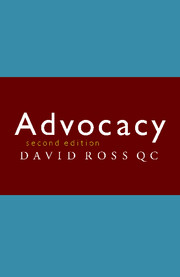Book contents
- Frontmatter
- Contents
- Foreword
- 1 The nature of advocacy
- 2 Preparation
- 3 Witnesses and questions
- 4 Examination-in-chief
- 5 Cross-examination: its qualities
- 6 Cross-examination: method and style
- 7 Cross-examination of experts
- 8 Cross-examination on documents
- 9 Re-examination
- 10 Admissibility, objections and submissions
- 11 The addresses
- 12 Plea in mitigation
- 13 Appeals
- 14 Legal writing
- 15 Etiquette and ethics
- Index
- Frontmatter
- Contents
- Foreword
- 1 The nature of advocacy
- 2 Preparation
- 3 Witnesses and questions
- 4 Examination-in-chief
- 5 Cross-examination: its qualities
- 6 Cross-examination: method and style
- 7 Cross-examination of experts
- 8 Cross-examination on documents
- 9 Re-examination
- 10 Admissibility, objections and submissions
- 11 The addresses
- 12 Plea in mitigation
- 13 Appeals
- 14 Legal writing
- 15 Etiquette and ethics
- Index
Summary
The best advocates are great artists. In this short book I have referred to what some of these advocates have done. My aim is to pass on their lessons. The best advocates have an out-and-out knowledge of all the technical rules. That is their starting point. There are no short cuts. They commit the rules to memory so they can be put to use at a moment's notice.
The best advocates are in tune with courts and fact-finders. They know the law and the court's practice. How they put their skills to use depends on their preparation and their judgment as the case runs. I have written down what many of them have done. But it is not dogma. In every generation there are classy advocates who find some new way of cross-examining, or addressing or doing all those little but important things that are called for in a trial.
Advocacy is a little like the language that is its medium. It is in a constant state of change. The excellent advocates of the past found new means of winning cases. Immerse yourself in their lessons but treat it as a study of history. It is now your task to find your own new ways. We all depend on you to keep the flame of justice burning bright.
- Type
- Chapter
- Information
- Advocacy , pp. xi - xiiPublisher: Cambridge University PressPrint publication year: 2007



